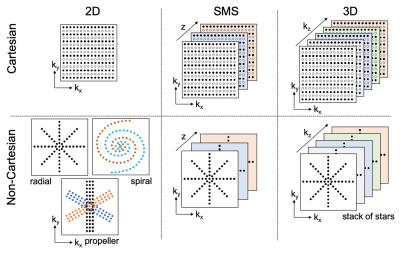Weekend Educational Session
Common Challenges in Body MRI
Session Topic: Common Challenges in Body MRI
Session Sub-Topic: Common Challenges in Body MRI
Weekend Course
ORGANIZERS: Dianna Bardo, Mustafa Shadi Bashir, Vikas Gulani
| Saturday Parallel 1 Live Q&A | Saturday, 8 August 2020, 15:00 - 15:30 UTC | Moderators: The Environment & Physics of Challenges in MRI: Verena Obmann |
Skill Level: Basic to Advanced
Session Number: WE-25
Overview
Image acquisition in a patient who cannot or will not cooperate is challenging. This educational course is divided into two segments: 1) image acquisition tricks and tips which enable dealing with patient motion, including fast imaging techniques and maintaining diagnostic signal to noise and spatial resolution; and 2) challenges related to specific patient populations who are not able to or will not cooperate with MR imaging and strategies to overcome motion and other artifacts.
Target Audience
MRI physicists and physicians.
Educational Objectives
As a result of attending this course, participants should be able to:
- Formulate sequence and MR parameter strategies for overcoming common patient-related challenges; and
- Recognize challenging patients and prepare strategies for successful imaging.
| The Environment & Physics of Challenges in MRI | ||
| Coils, Position & Sequences: Optimal Image Acquisition
Shreyas Vasanawala
temp
|
||
| Artifacts: Signal, Time, Speed & Image Quality
William Masch
|
||
| Getting into the Room: The MRI Environment & Implants, Pacemakers, etc.
Scott Reeder
With the increasing number of implanted metallic devices in patients, as well as non-medical implants such as shrapnel or body piercings, MRI safety screening becomes more essential than ever. This presents an increasing challenge to ensure that patients undergoing this potentially lifesaving diagnostic exam can be performed in the safest manner and avoid injury to the patient. It is for this reason that it is essential that institutions develop standardized procedures that can address the existing and increasing number of metallic implants in a systematic way to ensure the safety of our patients.
|
||
 |
MRI without Sedation & Anesthesia. Are we there yet?
Suraj Serai, Heather Mcclung, Ahmad Rizwan, Houchun Hu, Amol Pednekar, Rajeev Subramanyam, Hansel Otero
Newer motion robust acquisition methods are now available that have the potential to significantly minimize or remove the need for sedation and anesthesia in abdominal imaging. These new acceleration and motion robust MR techniques allow for free-breathing abdominal MRI and should allow for a decrease in MR scan times and sedation requirements. Familiarity with the advantages and trade-offs of these methods is essential for the radiologist performing the optimal study and for guiding the technologist acquiring the MR images.
|
|
| Uncontrollable, Unwilling & Uncooperative Patients | ||
| Neonates & Children: Uncontrollable & Uncooperative
Sarah Bixby
|
||
| From Claustrophobia to Obesity: Will Not Cooperate or Fit
Victoria Chernyak
|
||
| Emergency Radiology: Acutely Ill & Unable to Cooperate
David Grand
|
||

 Back to Program-at-a-Glance
Back to Program-at-a-Glance Watch the Video
Watch the Video Back to Top
Back to Top